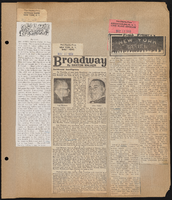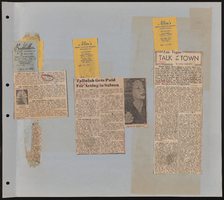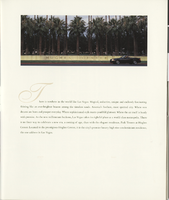Search the Special Collections and Archives Portal
Search Results
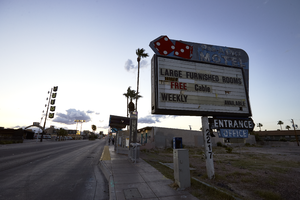
Photographs of Par-A-Dice Motel sign, Las Vegas (Nev.), April 18, 2017
Date
Archival Collection
Description
Site address: 2217 Fremont St
Sign owner: Bartsas Mary 14 LLC
Sign details: A .77 acres vacant lot, only sign remains. The property was consumed by fire in the mid-1990s.
Sign condition: 2 - Bad condition, graffiti all over, parts fallen off, reader board smashed in, paint chipping off, holes all over structure especially the bottom, more than likely does not light up.
Sign form: Back to Back pole sign
Sign-specific description: Pole sign with reader board as primary portion of sign, top of frame for reader board has a pair of dice with a 4 and 3 side showing. Dice painted red as is traditional style for casinos, surrounded by skeleton neon tubing. "Pair A Dice" is painted in white with skeleton neon tubing outlining the wording. Reader board with cut out letters still used. Tiny bubble protruding from the bottom reads "Entrance Office" also painted in white and outlined with neon tubing. Address is painted on support pole.
Sign - type of display: Neon
Sign - media: Steel and Plastic
Sign environment: Surrounded by other motels, some commercial and residential
Sign manufacturer: No external markings for sign company or designer
Sign - date of installation: Unknown - but not the original from 1953.
Sign - date of redesign/move: Motel originally had a rooftop sign topped with a pair of large dice.
Sign - thematic influences: Casino themed, a popular theme in the 50s for Fremont Street area motels
Survey - research locations: www.roadarch.com, assessor's website
Surveyor: Danny Jacobs
Survey - date completed: 2017-08-12
Sign keywords: Neon; Steel; Plastic; Pole sign; Reader board; Back to back
Mixed Content
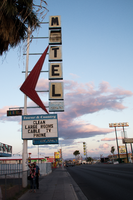
Photographs of Towne and Country Motel sign, Las Vegas (Nev.), April, 18, 2017
Date
Archival Collection
Description
Site address: 2033 Fremont St
Sign owner: Huang Hsiu Ping
Sign details: Sold in 2009 for $1 millon. It a .66 acre lot with an original construction year of 1958, with additions in 2000 and 2007.
Sign condition: 2 - O Panel knocked out, broken lexan covering the Pool wording of neon, heavy discoloration of the letter T and the E is almost completely worn off. Sun damage in the paint, otherwise looks functional.
Sign form: Back to Back Pole Sign
Sign-specific description: Pole sign that is double sided, Motel reading on either side with flag like components hanging off the support pole, each letter with its own component. A giant red check-mark shaped arrow in the center of the sign grabs the visitor's attention with its bright vibrant red color and its neon tubing filling it its shape, used as a directional tool into the parking lot. Underneath the arrow is a tiny reader board with cutout letters listing the amenities available in each of the rooms. Underneath the reader board is a little component that spells Pool with neon outlining the letters. The color scheme ranges from pale baby blue for the framework of the letters and reader board, and the bright red of the arrow.
Sign - type of display: Neon, internally lit "Motel" letters, and reader board
Sign - media: Steel and Plastic
Sign environment: Surrounded by other motels and hotels, and near a residential area
Survey - research locations: Motel website, and conversation with owner
Survey - research notes: Owners seemed aggravated by survey
Survey - other remarks: Open from 8 am to 4 pm, they close on Mondays entirely
Surveyor: Danny Jacobs
Survey - date completed: 2017-08-12
Sign keywords: Neon; Steel; Plastic; Reader board; Pole sign; Back to back; Internally illuminated
Mixed Content

Transcript of interview with Christopher Maestas by Claytee White, September 14, 2008
Date
Archival Collection
Description
Christopher “Chris” Maestas (1965-2009) was an engaged educator and leader within the Chicano, Latinx, and Henderson communities. As he traced back his Latinx heritage, he explored his father’s hometown in Llaves, New Mexico, where he and his family were discriminated for their non-white demeanor; and his mother’s paternal Spanish roots; his grandfather came to work in Henderson, Nevada at the Basic Magnesium Industrial (BMI) plants during World War II. The Chicano and Spanish cultures played a significant part in defining his role within the community. For Chris, Chicanos were “people that lived in the southwestern United States particularly southern Colorado, New Mexico and northern Arizona that were originally Mexican citizens before the treaty (Treaty of Guadalupe Hidalgo) was signed and then after the treaty was signed they became Americans.” In this interview, he dives into the difference between Chicano and Spanish cuisine and gives his own tips on how to make Spanish chile relleno. Chris discussed what life was like in Henderson living in Henderson Camp when his grandfather emigrated from Spain in 1943. He described the evolution of the Henderson community in the 50s through his parents’ experiences living in the Hispanic communities of Victory Village and Carver Park. During his childhood in the early 70s, Chris recalled living in Henderson when it was known as Basic and living in a small town-site house. One of his most special recollections was from the summer of 1980, when his family purchased their first set of air-conditioning units. As a passionate teacher and 1984 alumnus from Basic High School, he advocated student engagement as Student Council Advisor. Chris was also an active member of the St. Peter the Apostle, Catholic Church, Knights of the Columbus group and LUPE (Latinos United for Perfect Equality) Club. The LUPE club promoted equality for the Hispanic community and family values. Chris described their Saturday picnics at BMI Park and the annual Henderson Industrial Days festival.
Text

Transcript of interview with Gerald Gordon by Barbara Tabach, November 02, 2016
Date
Archival Collection
Description
In 1961, at the age of thirteen, Gerald ?Jerry? Gordon became a bar mitzvah. This typical coming of age celebration was unusual in that he had simultaneously studied in both his home state of California and his adopted home of Las Vegas, where he spent summers with his grandparents. 1961 is also the same year that the Gordons made Las Vegas their permanent home. Jerry graduated from Las Vegas High School, attended University of Nevada, Las Vegas and earned his law degree from University of California, Los Angeles. His gregarious and trustworthy personality led him to career building steps in the legal community of Las Vegas that included illustrious names such as Louis Wiener, Jr., David Goldwater, Neil Galatz, and many others. His personal law specialty became bankruptcy, especially dealings with hotel/casinos. As a member of the Jewish community, Jerry?s energy and expertise to organize was instrumental in the construction of Congregation Ner Tamid, the reform synagogue, at its site on Valle Verde and I-215. It was a multi-year process and includes a vast array of stories?a cash donation from Moe Dalitz, finalization of receiving of a donation land from the Greenspun family during the High Holy Days, and the ongoing challenges of a building campaign during a recession. In addition, he explains that CNT included two unique negotiations: 1) a cell tower and 2) a solar field on the synagogue?s property. Jerry and his wife Yvonne met while attending UNLV. Yvonne taught math at various levels in the Clark County School District. They raised their two children, Sara and Jeffrey, in Las Vegas, and forged an important role together in Congregation Ner Tamid. In April 2017, they were among those honored for their work with the synagogue.
Text

